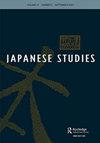Family-Run Universities in Japan: Sources of Inbuilt Resilience in the Face of Demographic Pressure, 1992–2030
IF 0.4
Q3 AREA STUDIES
引用次数: 21
Abstract
Minister to dissolve Parliament, and the issue of human rights in the Japanese Constitution are still relevant today. The Japanese Prime Minister must still act with caution in the light of sensitive party factional balances in considering when to go to an election. The human rights issues, notably freedom of speech, remain a problem more generally in Japanese society today (see Stockwin & Ampiah, 2017, for insights into this contemporary issue). The volume tells us much about David Sissons, the man and the scholar. A gentle and shy person, who did not chase personal fame or reputation, he was nevertheless dogged in his pursuit of the facts which would help answer the research problems he had posed. Probably best known today for this path-breaking historical research on the Australia–Japan relationship in its many avenues, Sissons was a familiar face at the Australian Archives reading room in Canberra for many years, where he would always provide advice to those who were trying to find their way around government documents and the associated complexities of the bilateral Australia–Japan relationship. Sissons’ important research, which has been brought to the light again in these volumes, reminds us of the quiet influence he had within the discipline over the many years when he was at the ANU, the relevance his research continues to have for scholars today, and the further impact that his collected papers at the National Library are likely to have into the future as they are accessed by other scholars.日本家族经营的大学:面对人口压力时内在韧性的来源,1992-2030
大臣解散国会,日本宪法中的人权问题今天仍然具有现实意义。在考虑何时举行选举时,日本首相仍然必须谨慎行事,考虑到敏感的政党派系平衡。人权问题,尤其是言论自由,在今天的日本社会中仍然是一个更普遍的问题(参见Stockwin & Ampiah, 2017,对这个当代问题的见解)。这本书向我们讲述了很多关于大卫·西森斯这个人和学者的故事。他是一个温和害羞的人,他不追求个人的名利,然而,他坚持不懈地追求有助于回答他提出的研究问题的事实。今天,西森斯最为人所知的可能是他对澳日关系的开创性历史研究,研究的途径很多。多年来,他一直是堪培拉澳大利亚档案馆阅览室的一个熟悉的人,在那里,他总是为那些试图在政府文件和澳日双边关系的相关复杂性中找到方法的人提供建议。西松斯的重要研究在这几卷书中再次被曝光,这让我们想起了他在澳大利亚国立大学(ANU)工作多年时在这门学科中所产生的悄然影响,他的研究对今天的学者们仍然具有重要意义,他在国家图书馆收集的论文很可能会对未来产生进一步的影响,因为其他学者也会访问这些论文。
本文章由计算机程序翻译,如有差异,请以英文原文为准。
求助全文
约1分钟内获得全文
求助全文

 求助内容:
求助内容: 应助结果提醒方式:
应助结果提醒方式:


